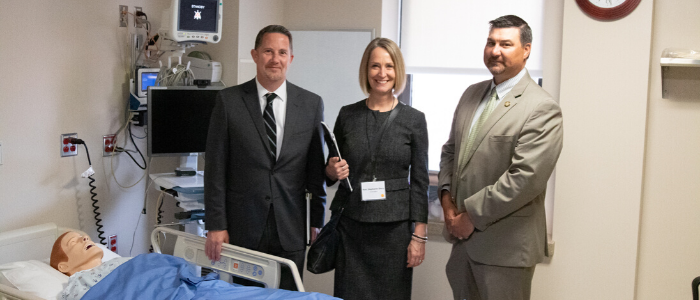Nebraska Featured in National Center Newsletter: Keeping Courts Open
An interview with State Court Administrator Corey Steel is the top feature in the National Center for State Court’s April 14 Newsletter. The article (below) outlines steps Nebraska courts have taken to prepare for and implement work alterations brought about by social distancing recommendations from the Center for Disease Control and Prevention.
Nebraska court leaders hosted the National Pandemic Summit in Omaha last May. From left, Nebraska Supreme Court Justices Jeff Funke and Stephanie Stacy and State Court Administrator Corey Steel
How one state keeps courts open while half of its staff works from home
Less than a year ago, court leaders, public health officials, legislators and executive branch officials from 25 states and three territories met in the middle of the country to start a conversation on how states should prepare for a pandemic. The two-day National Pandemic Summit, hosted by Nebraska Supreme Court Chief Justice Michael Heavican, occurred at the University of Nebraska Medical Center, home to the country’s largest biocontainment unit.
Very few people predicted an unknown pandemic was imminent, but the summit, the first-of-its-kind, now looks to be prescient as the nation fights COVID-19.
Courts, which were never set up to operate with most of its staff working from home, now find themselves in that position. We recently interviewed Corey Steel, Nebraska’s state court administrator, about how his state is managing with about half of its 1,500 or so judicial branch employees working from home. Steel, a member of CCJ-COSCA’s Pandemic Rapid Response Team, said that doesn’t include many others who are on “ready to work” status, not working because they aren’t needed now but still being paid and receiving benefits.
How did you manage to pull this off in such a short period of time? Did you rely on an emergency operations plan?
All of our county courts are required to have a COOP plan on file with the Administrative Office. They are asked to review and make modifications and changes each year. So that was a good starting point. I pulled together an administrative team that created specific emergency preparedness guides for each court across Nebraska. This was a guide for local courts to create their plan of action during this pandemic. It helped them focus in on what to do when courts went down to limited operations and staffing. We held webinars and helped facilitate the plans with all of our courts. We were lucky in Nebraska as we had a few weeks to prepare, being in the middle of the United States. But it was almost like we were creating the plans while moving into action at the same time.
Did your courts have enough computers and other equipment to do this effectively, or are some court staffers using their personal computers and printers?
Our courts are equipped enough to provide essential functions. We are not equipped with laptops etc. to do business as usual and have all staff able to telecommute. We have learned a lot and now know we will work toward being more mobile if this should ever happen again. Our state IT will not allow personal equipment to be utilized but what we have done is if someone is going to be working from home for a long period of time, we will allow them to take monitors, keyboards and computer towers home if they have internet access.
What are the biggest challenges to making this work?
Juggling all the balls in the air. Trying to keep the court system operational while keeping staff and citizens safe. Also looking into the future and planning for the tsunami of cases that will hit us when we are back to full capacity.
What ends up falling through the cracks?
You hope nothing, but a lot of things get placed on the back burner that are not pressing or emergent.
For stories about how court employees are doing their jobs from home, please go to Stories from Inside the Courts.


